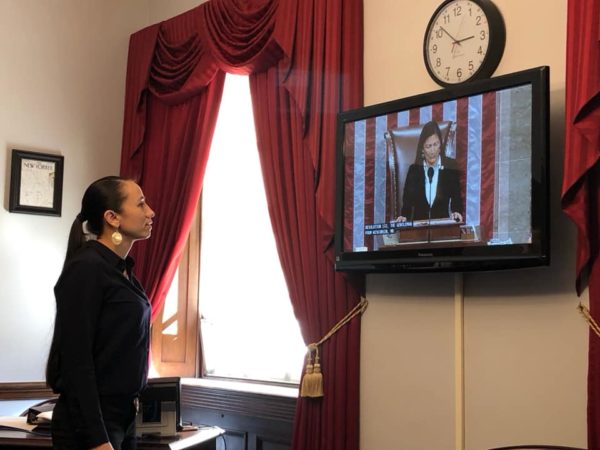
- Details
- By Levi Rickert
Breaking News
WASHINGTON — U.S. Representatives Sharice Davids (D-Kansas) and Deb Haaland (D-New Mexico) have been chosen to serve on the Congressional Escort Committee ahead of tonight’s State of the Union address.
Davids and Haaland will join a bipartisan group of members of Congress, including House and Senate Leadership, in escorting the President to the House Chamber for the State of the Union address.
“As we enter the House Chamber tonight, Rep. Sharice Davids and I will be a clear contrast to the President during this year’s State of the Union Address. When folks see us escorting the President into the chambers, I want them to remember that this country is for everyone -- no matter where they come from, what their background, or who they love,” said Haaland.
“It’s an honor to be selected for the Congressional Escort Committee, particularly because it will give me the opportunity to meet with the president prior to his State of the Union address and share my hope that he will work with Congress on the issues most important to Kansas families – like lowering the skyrocketing cost of prescription drugs,” Davids said.
Davids (Ho-Chunk Nation) and Haaland (Pueblo of Laguna) are the first two Native American women elected to Congress.
More Stories Like This
Native News Weekly (August 25, 2024): D.C. BriefsUS Presidents in Their Own Words Concerning American Indians
Native News Weekly (December 14, 2025): D.C. Briefs
Wounded Knee Massacre Site Protection Bill Passes Congress
Two Murdered on Colville Indian Reservation
Help us defend tribal sovereignty.
At Native News Online, our mission is rooted in telling the stories that strengthen sovereignty and uplift Indigenous voices — not just at year’s end, but every single day.
Because of your generosity last year, we were able to keep our reporters on the ground in tribal communities, at national gatherings and in the halls of Congress — covering the issues that matter most to Indian Country: sovereignty, culture, education, health and economic opportunity.
That support sustained us through a tough year in 2025. Now, as we look to the year ahead, we need your help right now to ensure warrior journalism remains strong — reporting that defends tribal sovereignty, amplifies Native truth, and holds power accountable.
 The stakes couldn't be higher. Your support keeps Native voices heard, Native stories told and Native sovereignty defended.
The stakes couldn't be higher. Your support keeps Native voices heard, Native stories told and Native sovereignty defended.
Stand with Warrior Journalism today.
Levi Rickert (Potawatomi), Editor & Publisher

